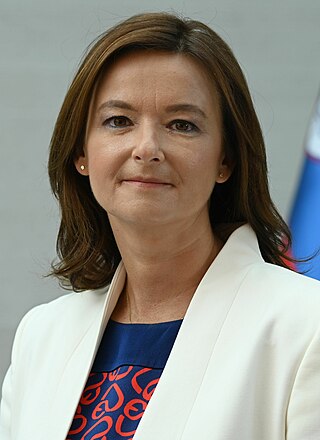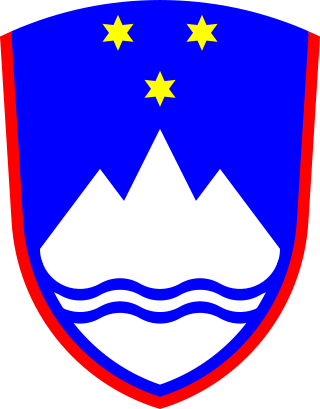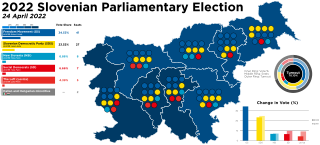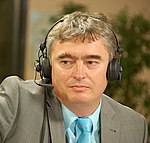
The Slovenian Democratic Party, formerly the Social Democratic Party of Slovenia, is a conservative parliamentary party; it is also one of the largest parties in Slovenia, with approximately 30,000 reported members in 2013.

The Social Democrats is a centre-left and pro-European social-democratic political party in Slovenia led by Matjaž Han. From 1993 until 2005, the party was known as the United List of Social Democrats. It is the successor of the League of Communists of Slovenia. As of 2022, the party is a member of a three-party coalition government with Robert Golob's Freedom Movement alongside The Left, as well as a full member of the Party of European Socialists and Progressive Alliance.

Zoran Janković is a Slovenian businessman and politician serving as Mayor of Ljubljana since April 2012. He previously served as mayor from 2006 to 2011.
Zares – Social Liberals was a social-liberal political party in Slovenia.

Gregor Virant is a Slovenian politician and public servant. Between 2004 and 2008, he served as Minister of Public Administration in Janez Janša's first government, between 2011–2013 he was Speaker of the National Assembly of Slovenia. He also served as Minister of the Interior and Public Administration in the government of Alenka Bratušek between 2013 and 2014.

Tanja Fajon is a Slovenian politician, former leader of Social Democrats, part of the Party of European Socialists and former Member of the European Parliament (MEP) from Slovenia. She has been serving as the minister of foreign and european affairs in the government of Prime Minister Robert Golob since 1 June 2022.

Parliamentary elections were held in Slovenia on 4 December 2011 to elect the 90 deputies of the National Assembly. This was the first early election in Slovenia's history. The election was surprisingly won by the center-left Positive Slovenia party, led by Zoran Janković. However, he failed to be elected as the new Prime Minister in the National Assembly, and the new government was instead formed by a right-leaning coalition of five parties, led by Janez Janša, the president of the second-placed Slovenian Democratic Party. The voter turnout was 65.60%.

Alenka Bratušek is a Slovenian politician. She was Prime Minister of Slovenia from March 2013 until May 2014, the first woman in Slovenia to hold this position. She was president pro tempore of the Positive Slovenia party from January 2013 until April 2014. On 5 May 2014, Bratušek submitted her resignation as prime minister.

Parliamentary elections were held in Slovenia on 13 July 2014 to elect the 90 deputies of the National Assembly. The early election, less than three years after the previous one, was called following the resignation of Alenka Bratušek's government in May. Seventeen parties participated, including seven new parties, some of which formed only months before the election took place. Party of Miro Cerar (SMC), a new party led by lawyer and professor Miro Cerar, won the election with over 34% of the vote and 36 seats. Seven political parties won seats in the National Assembly. Three political parties left the Assembly, including Zoran Janković's Positive Slovenia, the winner of the 2011 election. A leftist United Left party entered the Assembly for the first time, winning six seats.

The Party of Alenka Bratušek was a political party in Slovenia. The party was formed from a split from Positive Slovenia in May 2014, and merged into the Freedom Movement in June 2022. The party participated in both the Bratušek and Šarec governments.

The Modern Centre Party was a social-liberal political party in Slovenia led by Minister of Economical Development and Technology Zdravko Počivalšek, who succeeded former Prime Minister and former Minister of Foreign Affairs Miro Cerar as the party president. It formed in 2014 and merged with Economic Active Party in 2021, to form a party Concretely.

Igor Šoltes is a Slovenian lawyer and politician.

Violeta Bulc is a Slovenian politician who served as the European Commissioner for Transport from 2014 to 2019.

The 12th Government of Slovenia, led by Prime Minister Miro Cerar, was announced on 18 September 2014. It was formed following the 2014 parliamentary election won by the centre-left Party of Miro Cerar; it was the third government formed over four years. At 51 years, Cerar was the second oldest Prime Minister of Slovenia since Independence, following Andrej Bajuk at 56 years. The cabinet had on the day of inauguration the highest number of women ministers representatives, as there were seven women ministers out of sixteen ministers in total. Cerar's cabinet was the highest educated cabinet to date, with six members with a doctorate.

The 11th Government of Slovenia led by Prime Minister Alenka Bratušek was announced on 20 March 2013. It was the 11th cabinet of Slovenia. It has been formed after the parliament voted a no confidence vote to Janša's cabinet after SLS, DL and DeSUS left his coalition. On 27 February 2013 Alenka Bratušek was voted as the next mandatary and so became the first woman to do so in modern Slovenian history.

Parliamentary elections were held in Slovenia on 3 June 2018. The elections were originally expected to be held later in June 2018, but after the resignation of Prime Minister Miro Cerar on 14 March 2018 all parties called for snap elections. They were the third consecutive snap elections after 2011 and 2014.

Presidential elections were held in Slovenia on 22 October 2017. Nine candidates ran in the first round of the elections, in which the incumbent independent President Borut Pahor placed first and Marjan Šarec of the List of Marjan Šarec (LMŠ) placed second. No candidate received a majority of the vote in the first round, resulting in a run-off between Pahor and that was held on 12 November 2017. Pahor won the run-off with 53% of the vote; voter turnout in the second round was 42.13%, the lowest in any presidential election since independence.

The 8th National Assembly of the Republic of Slovenia was elected in the 3 June 2018 Slovenian parliamentary elections. At the order of President Borut Pahor, it first convened on 22 June 2018. The assembly was in session during the outgoing 12th Government of Prime Minister Miro Cerar and elected the 13th and 14th governments. It was the fourth consecutive time in which centre-left and left-wing parties had a majority.

The 13th Government of Slovenia was elected on 13 September 2018 by the 8th National Assembly. It is the first minority government in the history of Slovenia. On 27 January 2020, following the resignation of the Minister of Finance Andrej Bertoncelj, Prime Minister Marjan Šarec announced his resignation. The National Assembly was informed on the same day following which the term of the 13th Government ended. Šarec is the third consecutive and in total fourth Prime Minister to resign, before him Miro Cerar, Alenka Bratušek and Janez Drnovšek resigned as well, the latter due to being elected President of the Republic. The 13th Government is the fifth consecutive and eighth government in total to not finish its term.

Parliamentary elections were held in Slovenia on 24 April 2022 to elect all 90 members of the National Assembly.
























